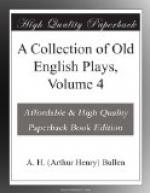[285] Old ed. “valley.”
[286] Old ed. “Flau.”
[287] Old ed. “Tul.”
[288] “Fortune, my foe, why doest thou frown on me?” is the first line of an old ballad.
[289] Not marked in old ed.
[290] Old ed. “Tis.”
[291] “Unreadie” = undressed.
[292] To the christening.
[293] There is no stage-direction in the old ed.
[294] Old ed. “foole.”
[295] “Duns the mouse”—a proverbial expression. See Dyce’s Shakespeare Glossary.
[296] Old ed. “a close.”
[297] Not marked in old ed.
[298] i.e. bezzling, tippling.
[299] “Well nigh whittled, almost drunke, somewhat overseen.” —Colgrave.
[300] Not marked in old ed.
[301] Contracted.
[302] An allusion to the proverbial expression, Wit without money.
[303] An old form of “apron.”
[304] The citizens of London continued to wear flat caps (and encountered much ridicule in consequence) long after they were generally disused.
[305] Not marked in old ed.
[306] Not marked in old ed.
[307] Old form of digestion.
[308] Old ed. “Philantus.”
[309] More.
[310] Old ed. “Phylantus.”
[311] Quy. “and, swilling those bowels [bowls], Death did,” &c.?
[312] Old ed. “him himselfe.”
[313] See note [288].—In old ed. the words are given to Grac.
[314] See note [295].
[315] Hip-bone.
[316] Old ed. “are are.”
[317] Virg. Ecls. iv. 1. 49. Bovis is of course an intentional misquotation for Jovis.
[318] Honest.
[319] Old ed. “prig”; but on p. 375 we have “a mad merie grig.”
[320] The City of Niniveh and Julius Caesar were famous puppet-shows.
[321] Not marked in old ed.
[322] Old ed. “and.”
[323] Old ed. “Cittie Wife.”
[324] This speech is printed as verse in the old ed.
[325] Old ed. “witnesses.”



